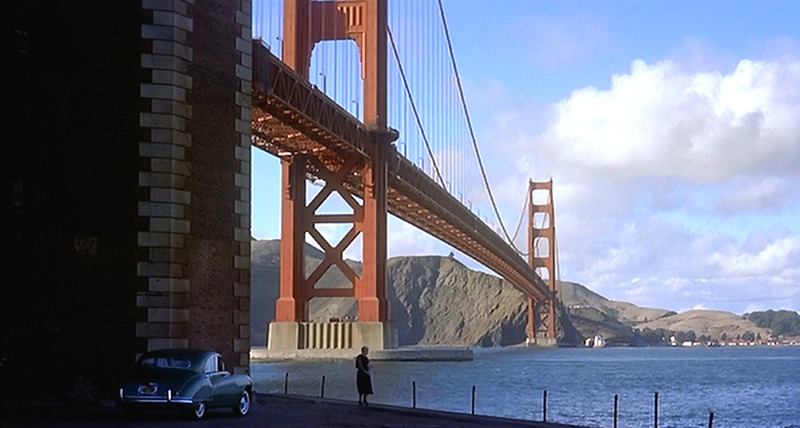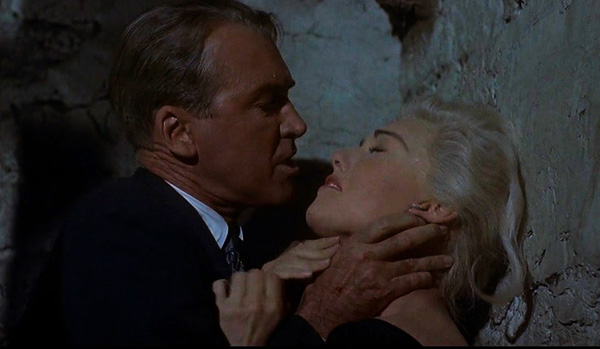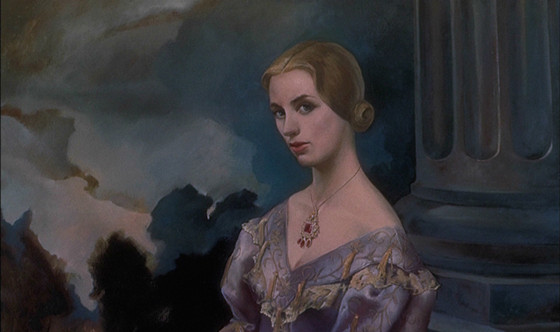5. Its unique structure

Vertigo starts with a chase we know nothing about, only includes Scottie as a detective for two minutes of the entire movie, reveals its big twist halfway through, and ends with the female lead dying while running away from the movie’s default hero. It’s bonkers, really. It shouldn’t work. But, instead of feeling awkward, it imbues the movie with a feeling all its own.
The script, by Alec Coppel and Samuel A. Taylor, seems to give no heed to the traditional plot structure audiences have come to expect, especially from big Hollywood films.
When Jimmy Stewart begins the movie chasing after some unnamed criminal, it seems to promise an exciting movie, showcasing police work and procedural grit. Not so. The scene exists only to show how Scottie became afraid of heights. When it jumps forward in time following that, he no longer even works as a detective. His phobia has rendered him all but incapacitated.
It is in this neutered state that Scottie is asked to follow an old acquaintance’s wife. Once he begins to tail her, Scottie falls in love with her. While this story is hypnotic and alluring, it only commands the next 30 minutes or so before the supposed wife dies by falling from a tower.
Once Scottie is cleared, a viewer would be forgiven for wondering what the rest of the movie will even be about. However, once Scottie finds a woman that looks uncannily like the Madeleine he knew. Before the audience can even be confused, though, she has a flashback revealing that she is, in fact, the wife who supposedly fell to her death.
In lesser movies, this twist would be the final moment of the movie. In Vertigo, this is the beginning of something much more sinister: Scottie begins to make Judy dress like Madeleine. Viewers know that she is “Madeleine” but Scottie does not. So, his obsession becomes unsettling in one aspect and perfectly justified in another.
The movie shifts to a more cerebral, probing tone than it originally adopted. The conflict is no longer physical but mental. As Scottie becomes convinced that she actually is Madeleine, Judy gets more scared. She eventually plays along, hoping they can live together in happiness, with her dressing as Madeleine again. Ironically, it has the opposite effect. Instead of rejoicing, Scottie’s hurt feelings lead to him forcing Madeleine/Judy to confront what she did and lead to him overcoming his fear.
6. Its dark, uncompromising ending

This is one of the most important things that makes Vertigo stand out. With an ending that challenges everything we’ve come to expect from movies, it stays with you forever. When Madeleine/Judy plunges to her death, Scottie is cured of his fear of heights. Only the traumatic experience of angrily forcing her to the top of the tower was able to be cathartic and jolting enough to remove his phobia.
But, in doing so, Scottie helped to kill the one woman that he loved. And she, in not admitting what she had done, in hoping that they could be together under deceitful circumstances, abetted her own demise. And then, the movie ends. Scottie is looking out at his deceased love, contemplating.
Though Hitchcock is a brilliant stylist with darker sensibilities, Vertigo is his most uncompromising ending. No one gets what they want. Scottie and Madeleine/Judy have become altogether different people. Scottie has spurned Midge and lost Madeleine/Judy forever. Madeleine/Judy thought that if she changed for Scottie they could be together and it cost her her life. Hitchcock and the script eschewed anything happy for the hard-earned contemplation an audience is led to by the unsettling final events.
7. It holds up better than any of Hitchcock’s other films

As mentioned in the introduction, Psycho used to be the consensus “best” movie of Hitchcock’s films. The Birds was cited by some. North by Northwest or Rear Window by others. But Vertigo suffers from none of the problems that have made those other movies go down in esteem. Vertigo’s impact is still felt, almost 60 years later.
Since the movie does not rely on much other than its spectacular story and the performances of its lead actors. There are no quaint notions of cross-dressing or attempts to make birds feel scarier than they are.
Rear Window has some similar qualities as far as being somewhat ahead of its time, exploring the idea of voyeurism in interesting ways. It also allowed Stewart to showcase his slightly more complex acting, which he excelled at in Hitchcock’s films. However, no other movie of Hitchcock’s, Rear Window included, has the benefit of such an unpredictable finale with such a lasting impact. It does not matter at all in what year a viewer watches Vertigo.
When Scottie stands at the top of the tower, with the bell chiming behind him, looking out at the dead body of his love, that viewer will be affected. Whether it’s goosebumps, tears, or simply catatonic shock, Vertigo leaves its audience with more emotions than any other Hitchcock films can muster. And it’s not even close.
8. The ambiguity of its message

Like previously mentioned in the discussion of the ending, Vertigo can be taken in a myriad of different ways. Some people say that its message is about the deconstruction of male dominance; others, the crippling effects of fear; still others, the strange momentum of obsession; and some might suggest, simply, love.
Whatever lens one views the movie through, though, it delivers. Like many movies with surprising endings, it invites discussion. Is Scottie ultimately to blame for Madeleine/Judy’s death? Is she the one to blame for her own death through her participation in the initial murder plot? What is Hitchcock saying about love? What is the movie saying about overcoming our fears?
As Scottie stands at the top of the tower at the conclusion, having overcome his fear of heights, what is he going to do moving forward? Will he be haunted forever? Is he glad that Madeleine/Judy is gone? Will he blame himself? Will he get romantically involved with Midge now? Vertigo seems to exist to excite and baffle minds. In the end, this is what makes it a classic. To be told what to think or what to feel is maddening. To be incited to ponder and to delve deeper, that is the purpose of watching great films.
Author Bio: Chad Durham is co-editor and contributing writer for RogueAuteurs.com. He also participates bi-monthly in the Rogue Auteurs podcast. His day job is high school English teacher. He has been in love with movies since seeing The Sting when he was 12. The thrill and emotion of seeing a great movie for the first time will always be one of his favorite feelings.